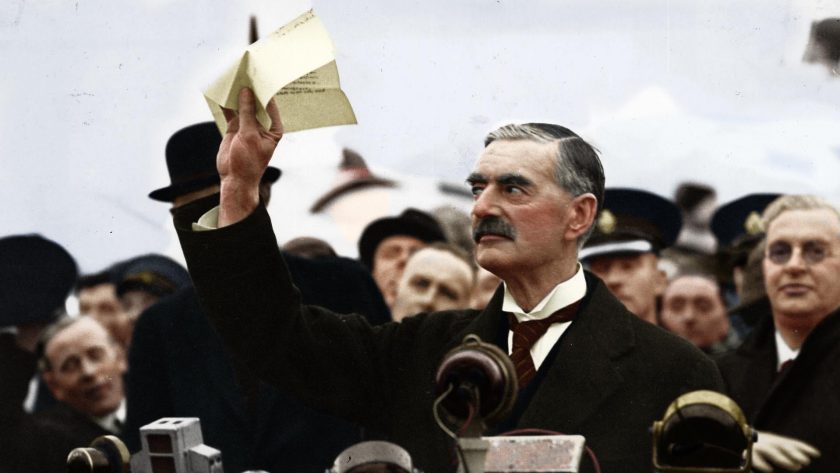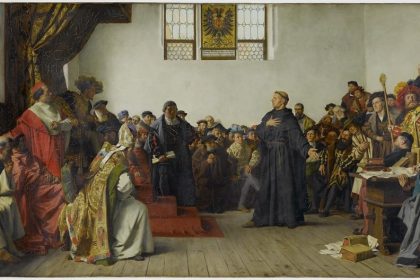Following 30 September 1938, the phrase ‘‘Peace for our time“ could be found on the cover of almost every British newspaper. It was originally spoken by the British Prime Minister, Neville Chamberlain, after his return from the dramatic diplomatic negotiations, which occured in Munich.
Chamberlain believed that appeasement would guarantee peace and stability in Europe and namely between his government and the Third Reich, Italy and France. The British public and Chamberlain, himself, deemed the negotiations to be very reasonable, and the press praised the Prime Minister upon his return to London where he received a warm welcome. In the following days the government received more than 20,000 letters and telegrams thanking Chamberlain for averting war.
There were few in Britain who didn‘t share the wishful thinking of their Prime Minister and balked at the prevailing public opinion. Winston Churchill was one of these, and he declared the Munich appeasement to be shameful and dishonorable believing that it would not prevent war but only delay it. In his speech on 05 October 1938 – only few days after the agreement – Churchill cited Daniel 5:27 “You have been weighed in the balance and found wanting.” He said:
‘‘We have sustained a defeat without a war, the consequences of which will travel far with us along our road; they should know that we have passed an awful milestone in our history….And do not suppose that this is the end. This is only the beginning of the reckoning. This is only the first sip, the first foretaste of a bitter cup which will be proffered to us year by year unless by a supreme recovery of moral health and martial vigour, we arise again and take our stand for freedom as in the olden time.“
The events which followed proved just how true Churchill’s critique and warning was. In the end the ‘‘peace guarantees“ of Chamberlain‘s government have been established as naive and an utter failure. Only a few months following the annexation of the Sudetenland and the partition of Czechoslovakia, World War 2 began, one of the bloodiest periods in human history.
This historical example serves as a lesson to us of how good intentions cannot always bring true peace and stability and that neither political balancing nor agreements of sacrifice can ensure and prevent conflict. An old tried and true proverb declares that ‘‘the road to Hell is often paved with good intentions.“
The Bible, as the primary source of truth for Christians and a guideline for ethical living, has a high regard for peace. Peace is more than the absence of war. The hebrew word ‘‘ שלום“ (Shalom) involves both a divine blessing and also a wish for abundance and goodness. The Messiah is described as the ‘‘Prince of Peace“ and in the New Testament Jesus promises believers, who are promoting peace, that they will experience a special blessing as the ‘‘children of God“ (Mat. 5:9).
But the Bible also talks about a ‘‘false peace“, which is marked by undermining the scriptual revelation and replacing it with situational and popular ethics known as the Zeitgeist. The prophet Jeremiah criticised the religious elite of his time saying, ‘‘They dress the wound of my people as though it were not serious. ‘Peace, peace,’ they say, when there is no peace.“ (Jer. 6:14)
Centuries later the Prince of Peace, himself, said at one point to his disciples that he ‘‘didn‘t come to bring peace to the earth but a sword“. In the verse that follows Jesus also states that not only did he not come to bring peace but that divisions and struggles are a part of life for all who will follow him. Mat. 10:34-35 states, ‘‘For I have come to turn a man against his father, a daughter against her mother, a daughter-in-law against her mother-in-law.“.
This verses are especially relevant for Christians today. First of all for the persecuted Christians in Asia and Africa but also for those who are involved in modern cultural struggles in traditional Christian countries. These struggles can be very clearly seen in the United Methodist Church. There is no doubt that the majority of the bishops and clergy who proposed and appealed for the ‘‘One Church Plan“ did so with good intentions and out of a real concern to maintain the unity of the church. But what is the cost of such a ‘‘peace agreement“? It violates Biblical truth and embraces the millenial ethical view of marriage. It ignores the Book of Discipline and the tradition of the church.
According to the Scriptural advice of Jesus, such a proposal is absolutely unacceptable even when a politically correct worldview would call it ‘‘reasonable“ and declare that it will offer peace and unity. Those who criticise the ‘‘One Church Plan“ have often been accused of working against unity and peace in the church. But they are, as Churchill was, on the right side of history.
Methodists are standing at a crossroad. Those who are going in the direction that will allow for the blessing of homosexual unions and the ordination of practicing homosexual ministers may experience, like Chamberlain, praise and applause from public opinion for a short time, but they are leading their churches down a blind street with serious consequences. Therefore, it is always wise to think twice before we choose between false ‘‘peace and unity“ and a way, which may be harder being marked with struggles and conflicts, but at the end is one that will lead to a future that is healthy and global. We, in the WCA, have made our decision and have chosen the second route.
Source: wesleyancovenant.eu



